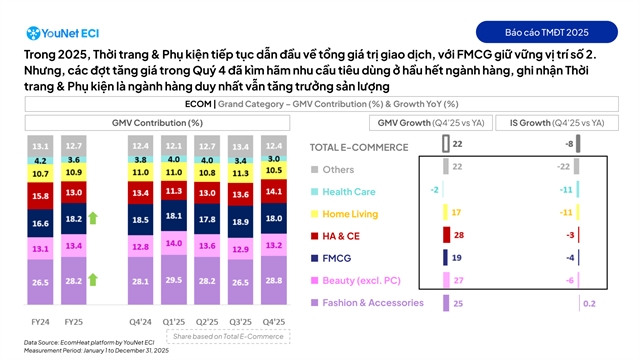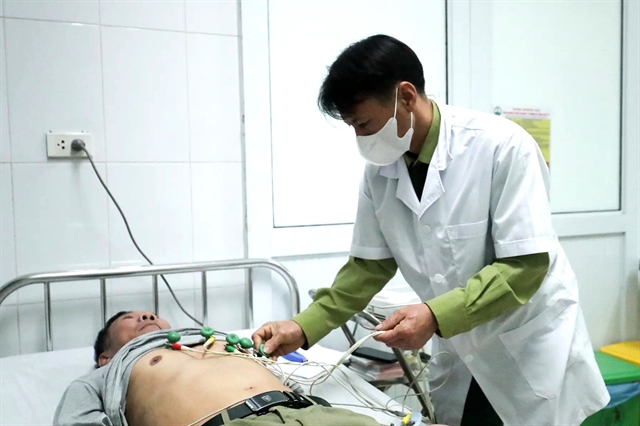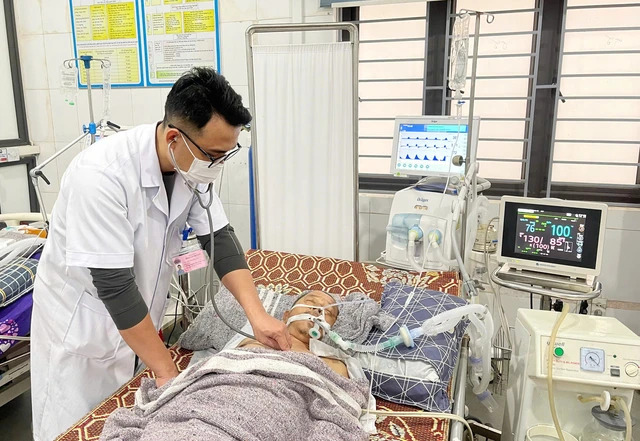

A short story by Hồ Anh Thái
 |
| Illustration by Đặng Hồng Quân |
That summer I visited Varanasi for the first time.
That city is considered a holy place because of its location on the sacred Ganges river. I had promised myself on this visit to that city I would visit the river.
I was not traveling for pleasure. I’d be working. As a postgraduate student researching Oriental culture, I had accepted an offer to do some translations for the Indian railway ministry. Before I went to India to study, I had worked as an interpreter for diplomatic delegations for several years, so that work wasn’t unfamiliar to me. The only unfamiliar thing was that it was my first time interpreting for the railway industry, which required me to know about locomotives and diesel engines. For example, until then I only knew “solution” meant a way of solving something. Only when I visited the petrochemical factory of the Varanasi railway company did I learn that it had another meaning: a homogeneous, molecular mixture of two or more substances. Sen was a Vietnamese intern who was studying under the guidance of Govinda. “Sen, please mix these two solutions into this tube to create a new solution,” Govinda instructed. Sen didn’t know English, but seeing Govinda raise one empty glass tube then point at two other tubes holding two separate solutions, she understood him right away, like a well-trained professional in the field. I didn’t have their technical knowledge, nor could I use solution’s most common meaning in my translation. So it was I learned something new.
Sen worked for the Sai Gon railway company and visited India as part of an internship sponsored by the United Nations. In those years, to win a UN internship was like hitting the jackpot. An intern could save enough money in a month to buy an old Japanese Honda motorbike, which was considered a huge asset in Viet Nam then. Sen was offered a stint of two and a half months, which could change her life. Since she didn’t know English, the Indian railway ministry called me. Every month they would pay me thrice three times as much as my scholarship. So if I worked for two months and a half, I could save the equivalent of one third of a secondhand Honda. I was on summer break and wanted to escape the scorching heat of New Delhi. I accepted the offer.
I helped Sen get on the right train to Varanasi. She was offered a bunk in an air-conditioned sleeping compartment. I sat in coach class with only a window open to receive hot winds.. One was a UN intern, the other a mere contracted interpreter. Still, caste differences or not I walked in and out of Sen’s cool cabin as frequently as I pleased. I ran back to coach, then wobbled along the train toward Sen’s cool compartment. She prepared mangoes, which were considered the king of fruits in India. Whether they were king or not, we ate them all. After eating I ran back to my hot car, and a while later, wobbled up to the cool one again. Sen laid out her rice and toasted sesame and peanut salt for lunch. Rice felt like our mothers to us.
After that I didn’t have to shuttle back and forth between the hot and cool cars anymore. Sen told me to sit down with her and help her talk to three Indians, a man and two woment who were sharing the compartment with her. They kept asking her questions but she didn’t know how to respond. Throughout the journey the three continually commented about how Vietnamese people, both female and male, had such great light skin.
* * *
Five days later I had to shuttle again. This time I shuttled between women and men.
Sen started interning at the petrochemical factory immediately. Her expertise was equal to her guide’s, as she had mastered every component of the internship programme when she worked in Sai Gon. The only reason she had applied for the internship was the money. Perhaps almost all Vietnamese interns were similarly overqualified. No sooner did a guide stop instructing than an intern carried out a task instantly and accurately, even without any knowledge of English.
On her fifth day at the factory, Sen received an invitation to a party to be held to welcome the railway minister on a work trip to Varanasi that evening. Sen replied that she would take part but wouldn’t utter a word without me. They suddenly remembered to extend an invitation to me.
At dawn and dusk, the air in Varanasi cooled off, becoming somewhat like the weather in Sai Gon. The party was held in the yard of the company’s guesthouse. The yard was spacious and fully shaded by big ancient trees: mangoes, bodhis and ashokas. Ashoka trees share the same name with emperor Ashoka the Great, who brought Buddhism from India to neighbouring countries in the third century BC.
Splendid lights and flowers were hung all over the yard, on the ashoka, mango and bodhi trees. Round tables were arranged into two sides. Men sat on one side. Women on the other. We were still clearly in India. Discrimination didn’t just exist between castes, but also genders.
Sen wore a traditional Vietnamese dress to the party. I led her to the female side, introduced her to the women, and then translated their introduction for her. Afterwards I withdrew to the male side. I didn’t want to confuse the men with my presence amid the women.
The men inquired after me with curiosity. We sat around a round table reserved for ten people. One man was an engineer, another was a doctorate. One man was a factory director, another a deputy director. One man was a manager, another a deputy manager. They asked about Viet Nam then talked about their city. Varanasi, which is also called Benares, was formerly known as Kashi. The Buddha used to be called the benign messenger of Kashi, because he had delivered his first sermon at Sarnath deer park in this city.
What a valuable piece of information. I immediately ran to the women’s side to inform Sen. We decided to visit Sarnath on the weekend. It was there that the Buddha had met the first five believers of Buddhism.
On this side the women went into an uproar. One woman was a workshop director, another a deputy director. One woman was a manager’s wife, another a deputy manager’s wife. One woman was a master’s degree holder, another was a doctor. After getting their degrees, the master’s or PhD holders all got married and settled down. Their education was put aside to make room for housework. It was another reality in India that I learned: One had better watch out when visiting somebody’s home, because the housewife who was cooking and wiping her child’s nose might be a doctor!
The women discussed vivaciously. We must take Sen to the Ganges first of all, they said:
“All Indians dream about visiting the section of the Ganges passing through this holy Varanasi site. The Ganges flows from a cave of ice on the Himalayas for thousands of kilometres down where the waters are the holiest. Believers flock there to pray for talent and luck and peace. Sick people pray for health. Sinful ones pray that the Ganges will wash themselves pure again. Those who want to send a message to the gods scoop a handful of river water into their palms and look upward to deliver it. Dying ones tell their relatives to bring them here to lie in wait for death, dip their dead bodies into the Ganges before cremation, and then sprinkle their ashes into the river so that their souls can reach heaven.”
We must take Sen to sail along the Ganges, the women said. They decided to appoint a woman named Samita to guide Sen on Saturday morning. Samita was a housewife who had a doctorate in agriculture from the Pusa National Academy of Agricultural Sciences, New Delhi. True to a researcher’s style, she provided the following information: Varanasi was nearly 3,000 years old, one of the oldest cities of humankind. American writer Mark Twain had come here and passionately said, “Benares is older than history, older than tradition, older than even legend and looks twice as old as all of them put together.”
One chemistry doctorate chimed in with an assertion about the unpollutability of the Ganges. Every year, millions of people bathed in the Ganges, but nobody suffered from skin diseases. Millions of people drank from the Ganges, but nobody incurred digestive disorders or any other illness. No bacteria could survive in the river. Doctor Howard Northop, who won the Nobel Prize in Chemistry in 1946, once said, “We know that the Ganges river is highly contaminated. Yet Indians drink out of it, swim in it, and are apparently not affected… Perhaps bacteriophage (the virus that destroys bacteria) renders the river sterile."
After every woman agreed that Sen would sail on the Ganges, I again left the women’s table to shuttle to the men’s. It was inconvenient for me to sit among the women. Thus I left Sen alone there for the moment and she had to gesture her hands to communicate with the women.
The minister who was the main guest was yet to arrive, which gave us men more time to chat. “Do you find India strange?” One man asked me. “In this biggest democracy in the world, men and women are still sitting separately. Gender segregation only occurs in parties and festivals though. In funerals and weddings, men and women still share space. As for caste discrimination, after India declared independence in August 15, 1947, it adopted a constitution which prohibits caste discrimination. But custom rules the law. Caste consciousness is in people’s blood. Let me tell you a story. Right in Varanasi, in 1973, Minister of Defence Jagjivan Ram was invited to inaugurate a statue of a freedom fighter on the campus of the prestigious Banaras Hindu University. Why did they invite him? Because he was a former student, an outstanding alumnus who would reflect well on his famous alma mater. Yet the ceremony turned into a chaotic brawl in which the audience threw shoes at him. Why shoes? The students from the upper class hurled shoes at him to remind him that he was the son of a shoemaker, a lower caste. The minister hurried away. As for the upper-caste students, they immediately washed the statue with the water from the Ganges because they thought it had been contaminated by the minister’s inferior background.”
At that moment the railway minister was still nowhere to be seen. I wondered what caste he belonged to, and whether shoes or brooms would be flung at him. And would the Hindu extremists here consider a foreigner like me a casteless heretic?
After the men and I conversed for a while, they discovered that I was studying Hindi. Oh great, what can you say in Hindi? They asked. “Me Viet Nam se hum,” I answered. It meant I came from Viet Nam.
The men nodded and asked what else. I was provoked. “Me Dili me char sal rohta hum.” I’ve been living in Delhi for four years. “Ha ha ha, what else? Do you know any obscene word?”
The deputy manager of the factory laughed and asked, “do you know what ‘matachod bahinchod’ means?” Of course I knew. It meant motherfucker sisterfucker. My college friends in Delhi had taught me those words, saying they meant hello. Only later did I learn that they were obscenities.
Right then the minister walked into the yard. Our obscene language ended. Yet my duty as an interpretation shuttle didn’t. Throughout the party, I kept running back and forth between the two sides, the two genders.
* * *
On Saturday morning Samita took us to the Ganges at 4.30am to see the sun rise above the river. In the dim twilight, we used a flashlight to light our steps as we walked into a small boat. The boat glided along the river, which was shrinking in the dry season.
The sun was yet to rise but the bank was already jam-packed with pilgrims. People hustled on the countless cement steps leading from the ground down to the river below. Men were half-naked, wearing dhotis on their lower halves which looked like sarongs tied up in a bundle between the two legs. Women waded into the river with all six metres of a sari wrapped around their bodies. They curved their hands into the shape of a bowl, scooped up a handful of Ganges water, and turned their eyes to the east where the sun would rise.
A loud shout boomed above the waters: “Ram Ram Ram. He Ram he Ram.”
Pilgrims shouted the name of god Ram, or Rama, who is Sita’s husband in Hindu epic Ramayana. In an instant, a fully round and transparently pink halo emerged brilliantly. A holy moment. A radiant sun above a radiant river. A sterile sun above a sterile river.
Samita said, “Indians believe that when they drink from the Ganges, their every wish will come true.” We saw men and women wading into the river, praying, then scooping up water with their hands. Samita said infertile women drank from the Ganges to pray for children.
Sen leaned a little over the side of the boat toward the waters. She dipped her two hands into the river, soaking them, sailing them along with the boat. After that she scooped up some water with which to wash her face. She too wanted to have a small share of holiness. I caught her secretly drink from her palms while washing her face. Holy water.
I remembered her story. For over a week following her, I had heard her talk about her family. She and her husband had been married for more than ten years but remained childless. They had adopted a child who was five years old now.
The boat glided along the bank toward the riverhead. Big and small temples elbowed each other on the bank. The holy city was filled with hundreds of holy temples. On the steps leading people down to the river to bathe were cremation sites. One site stretched into another. Corpses shrouded in white cloth were laid on wooden stretchers, carried down to the river, dipped into the waters, then put on a pyre of firewood. A wealthy family would use sandalwood. The heir of the deceased would then set fire to the pyre. One pyre after another blazed up, emitting thick smoke. Nearby, those who were bathing and drinking in the river would just keep on bathing and drinking.
Sen cleared her throat. She coughed dryly. Coughed and hemmed, as if she wanted to vomit. Samita reasserted the sterility of the Ganges. She added that in mountainous and remote regions, poor people who couldn’t afford cremation simply dropped their loved ones’ dead bodies into the river, believing the dead ones’ souls could also reach heaven that way.
At that moment the boat sailed past a floating object. At first glance, it looked blackish like the bottom of a capsized boat. In a while it revealed itself clearly. It was a bobbing bloated pitch-black dead Murrah buffalo with a curvy back and two pale white eyes.
Sen immediately doubled over and threw up hard. Samita and the boat’s owner panicked, sailed back to the bank and wanted to call an ambulance. They didn’t understand that kind of vomiting: once Sen could throw up everything from her stomach, she should be fine.
* * *
About a year afterwards, when I was studying at the University of Maryland in the US, I received a letter from Sen. She and I had been exchanging letters, but this time there was special news. Sen said she had been pregnant for four months. After 16 years of marriage, now at the age of 41, she got pregnant for the first time. Great news. Incredible news. If it was a boy, she would name him Ngọc Mừng, which meant a gemlike joy. A girl would be called Kim Mừng, meaning a goldlike joy. These half-Vietnamese half-Chinese names sounded fine to me!
More than twenty years passed.
I moved from one country to another and lost contact with Sen. Only one day last year, when I was living in Sai Gon, I suddenly opened an old phone book and saw her address. She lived near Vĩnh Nghiêm pagoda on Nam Kỳ Khởi Nghĩa road. There was no phone number. I decided to drop by her house, to give her a surprise.
According to my phonebook, Sen lived in the railway apartment building. It was a housing complex made up of numerous two-floor apartment rows running parallel to each other, creating a path in the centre that looked like a yard. I climbed up to the second floor of a row, walked along the corridor and stopped in front of the last apartment. I checked the room number, it was correct. But nobody was home.
I knocked on the door of the adjacent apartment. An old man who looked like he had been retired for a long time appeared. He said Sen had moved away ten years before. He didn’t know her new address either.
I was disappointed. That meant Sen and I had lost all contact now. I tried to stay longer to ask for a little more information about her. How had she and her husband been doing? How had their two children been?
“What two children?” the old man asked. They only had one adopted son who studied then stayed abroad to work, he said. I pressed on, explaining that Sen had written to tell me that she was about to give birth. Only then did the old man remember. “Right, she lost it,” he recalled. “She vomited violently then lost it.”
I recalled the day I received Sen’s letter in St. Mary’s City. That afternoon I was rowing on the Potomac. I stopped rowing and leaned over the side of the boat to look into the river. Stared deep into it. Nobody said the Potomac was holy, but people still leaned over and scooped up water to wash their faces with. Some of them even drank it.
Translated by Thùy Linh




